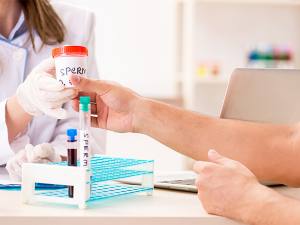Many fertility treatment articles are written specifically for a female audience, but infertility is an issue that affects both men and women. Here’s a summary of IUI for men, as males also play a significant role in these treatments.
What is IUI?
Artificial insemination, also known as intrauterine insemination (IUI), is a technique that involves placing sperm inside the woman’s uterus with a catheter to achieve fertilization. IUI is a first-line treatment for couples dealing with infertility when the causes of infertility are known and fit the criteria for that particular method. It is non-invasive and costs much less than IVF, so many couples may decide to try up to three cycles before moving on to another type of treatment to achieve pregnancy if unsuccessful. Sperm from a partner can be used for this procedure or IUI is also an option for couples using donor sperm.
IUI helps make sure the ejaculate being used to fertilize an egg is optimal to achieve fertilization before it’s manually inserted into the uterus. Check out this video where Dr. Walmer and Dr. Copeland talk about IUI and explain the process.
What Men Need to Know for IUI?
Timing is critical. Sperm only lives for approximately 30 minutes outside of the body and eggs only survive for about 12-24 hours after their release.
Men using their own sperm for IUI need to refrain from ejaculating for several days before their partner ovulates to ensure the highest sperm count. You will need to provide a sperm sample to your clinic on the day of the procedure. Since sperm only lives for about 30 minutes outside the body, it is recommended that you use your clinic’s collection room. However, if you will be out of town on the day of IUI, you can leave a sperm sample ahead of time that will be frozen and then thawed at the time of the procedure.

You and your partner will do an at-home pregnancy test two weeks after the procedure. If your partner received any hormones to stimulate ovulation, taking a test too early may give a false-positive result because the hormones may still be circulating and generate an inaccurate reading.
What is the IUI Success Rate?
Although there was a study a number of years ago that recommended against trying IUI first, more recent studies have come to a different conclusion. For families struggling with unexplained infertility, or if the reasons for infertility are known and fall into the target group, IUI can have success rates of 20-30% over three cycles. Given the price differential between IUI and IVF, this can be a very productive and cost-effective approach.
Over the past few years, Dr. David Walmer and Dr. Susannah Copland have helped hundreds of patients add to their families through IUI. To see if IUI is a good option for you, contact Atlantic Reproductive Center today to schedule an appointment.

